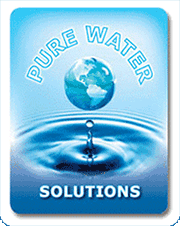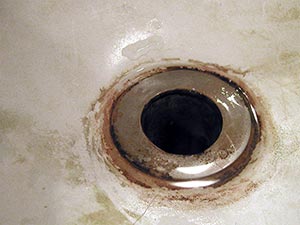Common Causes and Ways to Remove Black Slime on Your Faucets
Sludge, slime, gunk. Whatever you call it, you probably don’t want it near your drinking water. It’s sticky, it often smells, and it can leave you puzzled.
Black residue on faucets and fixtures is a very common problem and we’re here to answer:
- What causes black slime?
- What are the health effects of black residue?
- How you can get rid of the black gunk?
What Exactly is the Black Slime on Your Faucet?!
Before we get into the exact cause of the gross gunk, let’s take a step back and look at what flows from the tap. Along with H2O, tap water often contains dissolved minerals. Two of these minerals are iron and manganese.
Iron and manganese are both naturally occurring, non-hazardous elements found throughout the earth’s crust. As water travels through soil and rock, it can dissolve minerals containing these elements and holds them in solution.
Most drinking water contains traces of dissolved iron and manganese. While iron and manganese in drinking water are not known to have any health impacts, elevated iron and manganese concentrations in your water can be a nuisance, producing an unpleasant taste and off-putting odor.
Because iron and manganese are chemically similar, they often create similar aesthetic problems – black film, gunk, or sludge. The sticky, slimy, stinky residue can make itself at home nearly anywhere water flows in your home.
Whether it accumulates in the faucet aerator, around the tub drain, inside the toilet tank, or even inside your tea kettle, black slime is usually due to bacteria that feeds on oxidized iron and manganese in your water supply.
Is Black Slime on Fixtures Dangerous for Your Health?
There are no federal primary drinking water standards set for either manganese or iron because their presence in drinking water is not associated with health effects. However there are regulations regarding secondary standards for both. These standards are set to fight nuisance problems (e.g. black slime) and aesthetic issues (i.e. taste, odor, color).
Manganese and Manganese-related Bacteria:
The U.S. EPA recommends maintaining a manganese concentration at or below 0.05 parts per million (ppm) in drinking water. Neither manganese nor manganese-related bacteria are considered dangerous at the levels that typically occur in drinking water. Manganese exposure from water and food (our largest source of exposure) are not known to have a negative health effect. In fact, manganese is an essential nutrient and is required by the human body in small amounts. Similarly, manganese bacteria is categorized as non-pathogenic. Some evidence does suggest that if manganese is inhaled in high concentrations over time, it can lead to neurological issues–but this is rare and not caused by drinking water.
Iron and Iron-related Bacteria:
Like manganese, iron (and related bacteria) are not dangerous to human health. Drinking water standards for iron are set based on potential nuisance and/or aesthetic issues. The EPA recommends a secondary maximum contaminant level (secondary MCL) of iron in tap water at 0.3 ppm.
While iron-related bacteria often produce reddish-brown slime, when they react with naturally occurring tannins (organic matter from vegetation) it frequently forms black, sludgy residue. This is why many people spot black slime inside their tea pots. Tea contains a high concentration of tannins.
How Do I Know if There is Iron or Manganese in My Water?
The only sure fire way to know what is in your water is to test it.
Assuming you do not currently have a detailed water lab report, of your top 35 – 50 Contaminants in your well, the next step might be to test your water using a certified laboratory.
Pure Water Solutions can arrange tests for both city water and well water. This Essential Well Water Test includes analysis for both iron and manganese along with screening for many other contaminants that pose potential risks to you and your plumbing.
The final report will be emailed to you giving you all the required info needed to contact Pure Water Solutions (541-890-2751) for a professional, no obligation consultation and detailed guaranteed filtration quote, if needed.
If you are concerned or worried about iron and manganese in your water, please contact Pure Water Solutions.
541-890-2751
Free Onsite Test and No-Obligation Consultation
We can make any water Perfect – Guaranteed.
We use environmentally safe high-tech filtration systems with both the industry’s top digital control valve and advanced medias. Our systems last 25 – 30 years, have a 10 Year warranty and are virtually maintenance free filtered water without paying for a lifetime of ongoing annual service calls. All systems are installed by a Licensed Plumber.
As Southern Oregon’s most trusted, bonded, licensed, insured and highest reviewed company for water filtration and treatment.
We are proud to provide service to the following Southern Oregon communities:
Medford, Grants Pass, Ashland, Klamath Falls, Rogue River, Gold Hill, Shady Cove, Trail, Central Point, Eagle Point, White City, Phoenix, Talent, Jacksonville, Applegate, Williams, Murphy, Selma, Cave Junction, and Brookings.

